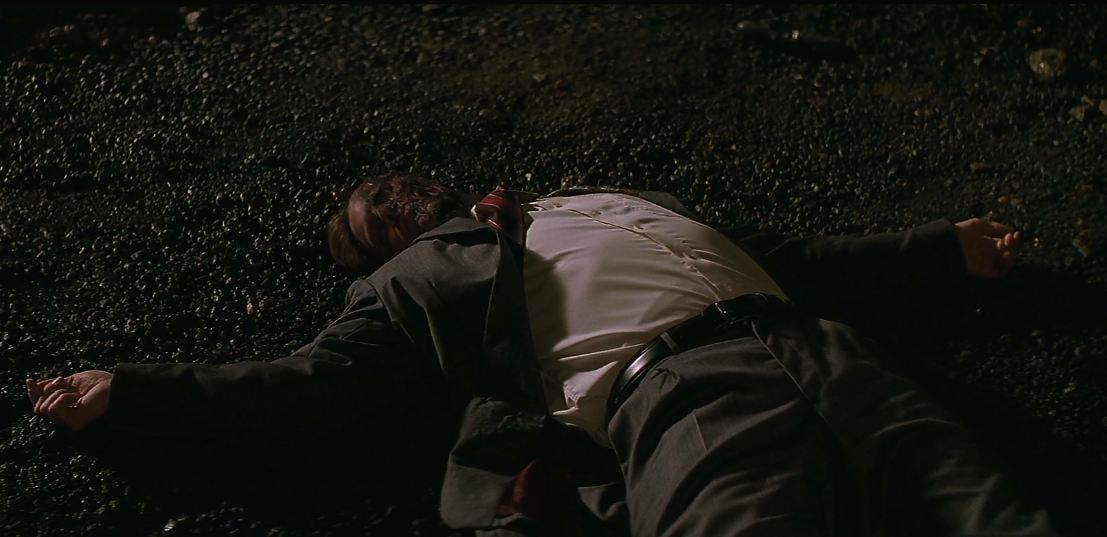Batman has more than one rule, but the one line that he refuses to cross - the one thing that would turn him from a crusader into a villain - is that he does not kill. Only taking Christopher Nolan's Batman into consideration then yes, he did break this rule by directly causing the fall that accidentally killed Harvey Dent.
Let's look at the scene:
Batman is shot, Dent is safe, and the boy's fate is undecided, but Batman can't let a coin determine that fate. He lunges at Dent and the boy and all three go over the edge. Despite his armor, Batman is injured and not at full strength. He is only able to save the boy before he himself falls after Dent. Crashing through more debris than Dent (who was pushed far enough out that he was clear (and who may have survived had he not been in such a badly burned condition)) Batman gets more injured on the way down and lands near Dent.
Later on when talking to Gordon, Batman says:
"You either die a hero or live long enough to see yourself become the villain. I can do those things, because I'm not a hero, like Dent. I killed those people. That's what I can be." ----- "I'm whatever Gotham needs me to be."
It's a great and powerful scene, but in its essence, it's one man (Batman) pushing another man (Dent) off a building and killing him (while saving an innocent boy), then taking the blame for not only Dent's death but the deaths caused by Dent as well. Batman is not just telling Gordon that he killed Dent, he is saying that he killed those people too. Batman feels directly responsible for their deaths and in Harvey's case, he is directly responsible.
This is the true genius of Nolan's Batman; he's not only real and plausible, he is constantly trying to figure out what he's doing, why is he doing it, and has he gone to far? Nolan made Batman break his most important rule.
A lot of fans don't want to admit that Batman killed. An accidental killing doesn't count as breaking his rule they say, but to Batman it does count. It will haunt him. The deaths Two-Face caused will haunt him. He takes the blame for everything that happened. He pushed Two-Face off of a building and Two-Face died. The line has been crossed. How will Batman deal with that? How will he deal with being a criminal? The next movie will definitely deal with this but it is a huge step for Batman.
Nolan has created a realistic Batman. In Batman Begins we got to see what makes a man become a Batman. What training, what psychological problems, what Gotham's corruption had to do with it. When fighting Ra's al Ghul, we started to see a bending of the rule not to kill. Leaving Ra's al Ghul on the train was not killing in Batman's mind because Ra's al Ghul had survived a seemingly unsurvivable situation before, plus he had planned meticulously. If Batman could survive it, then he assumed Ra's al Ghul could as well.
At the start of The Dark Knight we start to encounter a basic problem with his rule: if Batman doesn't kill, why do criminals need to fear him? By the end of the movie Batman has killed and has taken the blame for more killings. This not only adds to the myth of the Batman but it directly affects his mental state. Throughout The Dark Knight we see him wrestling with how far he should push himself, what is his limit, what keeps him from being the Joker?
Then he breaks his most important rule and it seems to define him more. Did he plan to kill Two-Face? No. Did he directly cause his death? Yes! He did it in the only allowable way, to protect the innocent, and he did so by accident, but he still killed and still broke his rule.
Now we have a whole new Batman going into The Dark Knight Rises. One who has killed. One who has become a villain. Yet he is more sure of himself and what he stands for than ever before.


